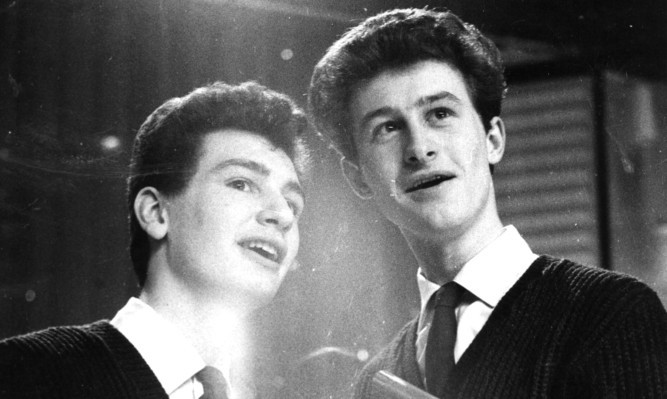
IT’S one of Britain’s most successful Eurovision entries ever.
More than a million copies sold, knocking one Elvis Presley off the top of the charts, and a hit across the Continent and farther afield.
It was the runner-up in Cannes in 1961 but, by the Contest’s own rules, should have won.
So surely the BBC would have featured The Allisons’ Are You Sure? at their gala concert to mark 60 years of Eurovision? Er, no.
“I thought perhaps we would have been included, considering we had one of the most successful British entries there’s ever been,” admits John Alford who, along with his late partner Bob Day, formed the duo who were marketed as brothers.
“Also, Andrew Lloyd Webber and Tim Rice wrote, saying Are You Sure?, a song I wrote, was their favourite-ever Eurovision song!
“I got in touch with the BBC and eventually a BBC producer rang back and asked what I was phoning them about!
“I said: ‘I actually thought you might have heard of us’ then had to explain who The Allisons were and what we were about, and then he asked: ‘Did you actually win it, because we’re only including winners?’.
“I said no, the song I wrote was voted second but in fact somebody did take me to one side at the time and said: ‘You do know technically you won?’.
“We were told Luxembourg had been voted the winner but the rules then were each entry had to be written and sung by a national, and their song was written by a French composer and the singer was a French film star!
“I was only 21 and had been brought up not to question your elders, we were very new in the business and very nervous not to say anything out of place.
“So we said we didn’t mind as our record was a hit in Britain and the Eurovision was very low-key at that point, there were only two TV channels, both in black and white.
“We had no ambitions or expectations of becoming big singing stars, we just wanted to make a record.
“We fell into the Eurovision completely by accident, couldn’t believe we had a hit, and then everything got crazy.”
John and Bob found themselves in the south of France after their record company entered them into A Song For Europe.
Sometimes called “the British Everly Brothers” because of their harmonies, they were young but had already been singing together for a decade, having paired up in the St Dionis church choir in Parsons Green.
“We joined it without knowing you got paid,” John, now 75, recalls. “It wasn’t very much, something like three pence per service and sixpence for weddings.
“You got paid every three months and the first time I got paid, in December, 1951, the choirmaster said: ‘Here’s your choir pay’ and gave me 24 shillings.
“I nearly fell over with shock 24 shillings at the age of 12?
“So we were two choirboys and we were astonished we found ourselves doing an international song contest.
“We’d never heard of it, so it hit us with some shock.
“In the mid-90s, I did a summer season in the south of France and a bloke from Radio Luxembourg interviewed me.
“He found all the European cover versions and put them on a CD for me there were 24.
“Our original was near the top of the charts in every country but there were five French, four German, two Dutch, Norwegian, Swedish, Finnish and Danish versions.
“And 40 years on, I met a bloke from Sri Lanka who, back when it was Ceylon, had been so enraptured by The Allisons, he and his brother recorded several cover versions and had hits with them!
“I thought what we’d done was a version of the old story of East End London boys fighting their way out of poverty through boxing.”
It wasn’t a glamorous life, though, as John adds: “When you become successful, you tour but when we started, the motorway system had only just begun, so we went by train.
“And entertainment wasn’t as popular. We did two weeks at the London Palladium with Frankie Vaughan, and Bob’s dad used to pick us up in his little Ford Prefect and take us home for cocoa.
“I was sharing a bedroom with my brother and my mum would ask what time we had to be at the theatre and then send me to the shops!”

Enjoy the convenience of having The Sunday Post delivered as a digital ePaper straight to your smartphone, tablet or computer.
Subscribe for only £5.49 a month and enjoy all the benefits of the printed paper as a digital replica.
Subscribe